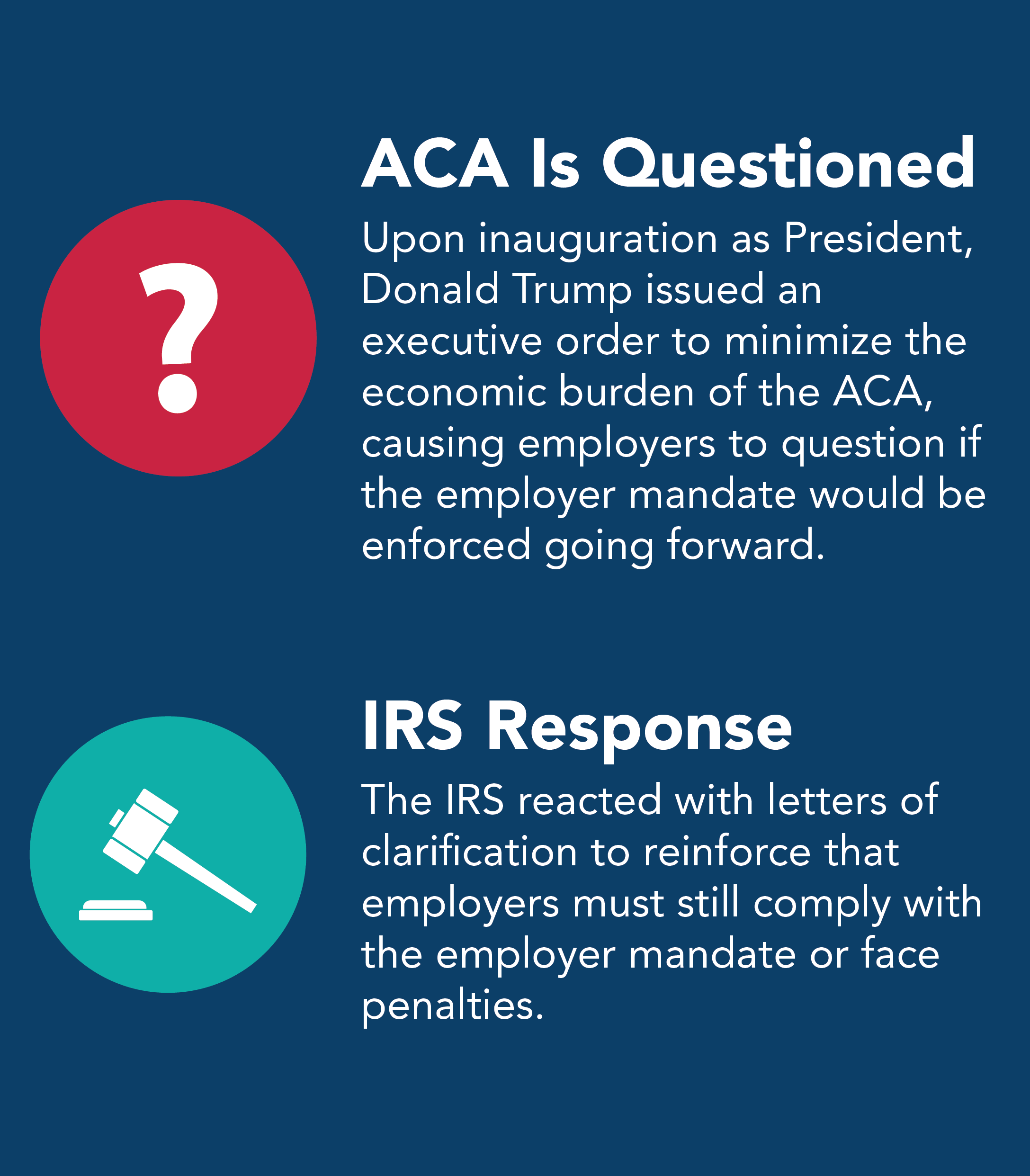
 Comprehensive healthcare reform legislation was signed into law by President Barack Obama on March 23, 2010. Known as the Patient Protection and Affordable Care Act, it was nicknamed the ACA or Obamacare. The ACA stipulates “employer shared responsibility rules” which require applicable large employers (ALEs) to offer affordable, minimum value health insurance coverage to their full-time employees or pay a penalty. These rules apply to employers with at least 50 full-time employees during the preceding calendar year. The employer shared responsibility rules are also known as the “employer mandate” or the “pay or play” rules. An “ALE” may be penalized if one or more full-time employees obtain a subsidy through the healthcare exchange because the employer did not offer health coverage, or the coverage offered is not affordable or does not provide minimum value.
Comprehensive healthcare reform legislation was signed into law by President Barack Obama on March 23, 2010. Known as the Patient Protection and Affordable Care Act, it was nicknamed the ACA or Obamacare. The ACA stipulates “employer shared responsibility rules” which require applicable large employers (ALEs) to offer affordable, minimum value health insurance coverage to their full-time employees or pay a penalty. These rules apply to employers with at least 50 full-time employees during the preceding calendar year. The employer shared responsibility rules are also known as the “employer mandate” or the “pay or play” rules. An “ALE” may be penalized if one or more full-time employees obtain a subsidy through the healthcare exchange because the employer did not offer health coverage, or the coverage offered is not affordable or does not provide minimum value.
The ACA Is Questioned
Upon his inauguration as President on January 20, 2017, Donald Trump signed an executive order to minimize the economic burden of the ACA until the law can be repealed and replaced. The order did not provide specific guidance related to any particular provision or requirement of the ACA, and appeared to be more of a mission statement for the President’s administration going forward. Further, only Congress is authorized to make changes to the ACA, i.e. through the legislative process. The President is not empowered to alter legislation. Nevertheless, business owners took notice of this executive order and began to wonder if the employer mandate would go away, along with any associated penalties.
The IRS Responds
The President’s executive order created confusion when it directed the Department of Health and Human Services and other federal agencies to “waive, delay, or grant exemptions from ACA requirements that may impose a financial burden”. In response, the Office of Chief Counsel within the IRS issued Letter numbers 2017-0010 and 2017-0013 on April 14, 2017, to clarify the impact (or lack of impact) of the executive order on the employer mandate rule. These letters confirmed that the pay or play rules continue to apply. Taxpayers must still adhere to the ACA requirements, including paying any penalties they may owe.
Where Do We Stand?
For the time being, it’s business as usual. Although both houses of Congress challenged the ACA between May and September 2017, all efforts failed to repeal and replace the law. The result is that the ACA is still in effect until the Senate and/or House, both Republican-led, can craft a viable alternative that will garner sufficient votes to proceed to the President’s desk for signature. In the meantime, ALEs must continue to comply with the employer shared responsibility rule as well as any other reporting requirements.
In fact, The ACA Times has reported that “all signs point to the IRS being prepared to enforce the employer shared responsibility mandate of the ACA”. The website suggests that by December 2017, “the IRS could be sending enforcement notices to inform businesses with 50 or more employees what they owe for failing to comply with the employer shared responsibility mandate”. These notices will serve to enforce the ACA compliance mandate starting with the 2015 tax year. The IRS website does not contradict this opinion and provides a lengthy Q&A dedicated to the employer shared responsibility provisions under the ACA, including information on how employers will be notified of any penalties assessed and how payments will be collected. Now that the myth of the employer mandate waiver has been dispelled, employers would be wise to ensure they have filed all necessary documentation with the IRS to minimize any potential penalties, and then revisit the status of their health insurance offerings and prepare to be ACA compliant, to avoid possible penalties in future tax years.
Where Can Employers Find Help?
MidAmerica’s TotalCare product, offered in conjunction with MyBenefitsChannel, is not just ACA compliance software, but a total ACA consulting service. It enables schools, government, and mid to large employers to reduce potential liability and internal ACA compliance workload, while keeping clients audit-ready. For a low Per Employee Per Month (PEPM) fee, the employer will receive a “Do It For You” (DIFY) solution that:
- Ensures 95% certainty of compliance
- Automatically rolls data into IRS reporting
- Auto generates required notices
- Tracks for audit preparation
- Provides optional audit management
- Is accessible via a mobile application
Despite a series of attempts to repeal the Affordable Care Act, the law is still intact. As your benefits compliance experts, MidAmerica will continue to monitor the status of any potential healthcare reform and ensure you are aware of any effects new legislation could have on your clients’ retirement and healthcare benefit plans. We are committed to providing quality benefits solutions to public sector employers while meeting their budget objectives. This commitment drives us to meet changes in the benefits environment with products that will ensure employers are compliant while receiving the best value for their money.
If you would like to learn more about the TotalCare product, please visit https://mymidamerica.com/acatotalcare/.
